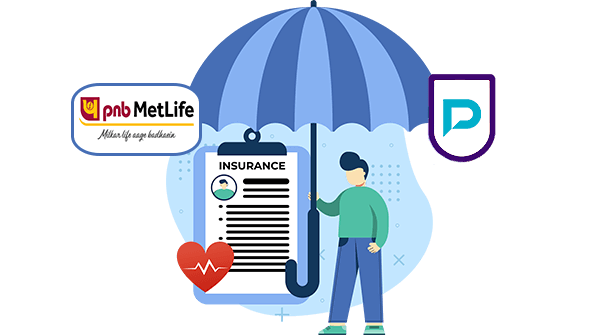Financial preparedness can help mitigate the burden on one’s loved ones in the face of the unavoidable reality of death. In the event of your untimely death, term insurance is a critical instrument that provides financial stability for your family. Sifting through the plethora of alternatives that exist within the Indian insurance market can prove to be a daunting task. We have assembled an all-encompassing encyclopaedia of India’s leading term insurance plans for 2024 to facilitate your decision-making.
Understanding Term Insurance
Term insurance is an affordable, risk-free protection plan that provides life coverage. It provides a mortality benefit to the insured’s beneficiaries or family if the insured passes away during the policy term. Affordability is the defining characteristic of term insurance, which enables individuals to obtain substantial life coverage at minimal premiums.
Factors to Consider When Choosing Term Insurance Plans
Claim Settlement Ratio (CSR): As a proportion of the total number of claims received during a fiscal year, the percentage of claims settled by an insurer. A higher CSR indicates a superior claim settlement track record.
Entry Age: The minimum age required to acquire the policy. Entry-age requirements for the majority of insurers are both minimum and maximum.
Premiums: The sum paid to maintain insurance coverage by the policyholder. Affordability and budgetary flexibility should characterise premiums.
Coverage Options: Seek out coverage options and supplementary benefits, such as accidental death benefits, critical illness coverage, and so forth, that provide flexibility.
Rider Options: Riders offer additional protection against specific risks, such as critical illness, disability, or accidental death. Consider the passenger options that each plan provides.
Policy Term: The temporal scope of protection offered by the policy. Select a term for your policy that corresponds with your financial goals and responsibilities.
Top Term Insurance Plans in India 2024
Here’s a curated list of the best term insurance plans in India for 2024 based on CSR, entry age, and premium affordability:
ICICI Pru iProtect Smart

Claim Settlement Ratio (CSR): 97.8%
Entry Age: 18 to 65 years
Term Coverage: Up to 85 years
Monthly Premium: Rs. 2,095/month
Annual Premium: Rs. 24,525/year
Special Features: They cover one’s entire existence until age 99. Additional features include the critical illness benefit, accidental death option, and protection against 34 critical illnesses.
HDFC Life Click 2 Protect Super

CSR: 99.4%
Entry Age: 18 to 65 years
Term Coverage: Up to 85 years
Monthly Premium: Rs. 1,837/month
Annual Premium: Rs. 20,997/year
Additional Benefits: With the Life Option, Life Plus Option, and Life Goal Option, this plan offers a range of adaptable coverage alternatives. Premium discounts and add-on riders, including Return of Premium (ROP) and Waiver of Premium on Critical Illness, are provided for online purchases.
PNB Metlife Mera Term Plan Plus

CSR: 99.1%
Entry Age: 18 to 65 years
Term Coverage: Up to 80 years
Monthly Premium: Rs. 1,840/month
Annual Premium: Rs. 20,768/year
Comprehensive Coverage: Life, Life Plus, and Life Plus Health are the three options. A fortunate total permanent disability or critical illness diagnosis exempts the insured from premium obligations. Coverage enhancement options are available in a customisable fashion.
TATA AIA Sampoorna Raksha Supreme

CSR: 99.0%
Entry Age: 18 to 60 years
Term Coverage: Up to 85 years
Monthly Premium: Rs. 1,549/month
Annual Premium: Rs. 17,543/year
Tailor-made Protection: This plan provides comprehensive protection, including life, life plus, life income, and credit protection options. In addition to rider and maturity benefits, women are eligible for reduced premium rates.
Bajaj Allianz Life eTouch Plan

CSR: 99.0%
Entry Age: 18 to 65 years
Term Coverage: Up to 85 years
Monthly Premium: Rs. 1,391/month
Annual Premium: Rs. 15,899/year
Versatile Coverage: Life Shield, Life Shield Plus, and Life Shield ROP are the four available plans. Premium returns, death benefits, and coverage for terminal illness are among the supplementary benefits.
Max Life Smart Secure Plus Plan

CSR: 99.5%
Entry Age: 18 to 65 years
Term Coverage: Up to 85 years
Monthly Premium: Rs. 1,693/month
Annual Premium: Rs. 19,235/year
Comprehensive Coverage: Protection features are included in the policy to provide extensive coverage for the insured and their family. Coverage for terminal illnesses and an exit value are included as additional provisions.
Canara HSBC iSelect Smart 360 Term Plan

CSR: 99.0%
Entry Age: 18 to 65 years
Term Coverage: Up to 85 years
Monthly Premium: Rs. 1,482/month
Annual Premium: Rs. 16,469/year
Adjustable Coverage: A changeable coverage amount option as circumstances evolve. Increased coverage and female purchasers are eligible for special premium discounts. Whole-life coverage is provided until the age of 99, with adaptable coverage options.
Kotak e-Term Plan

CSR: 98.5%
Entry Age: 18 to 65 years
Term Coverage: Up to 85 years
Monthly Premium: Rs. 1,672/month
Annual Premium: Rs. 18,998/year
Pure Risk Cover: Exceptional discounts for women and non-smokers, in addition to a solid reputation for superior protection, Rider add-ons, and three compensation options are provided for additional security.
Edelweiss Tokio Zindagi Protect Plan

CSR: 99.2%
Entry Age: 18 to 65 years
Term Coverage: Up to 85 years
Monthly Premium: Rs. 1,585/month
Annual Premium: Rs. 18,002/year
Whole-life Coverage: Provision of additional benefits, a reduction in the initial-year premium, and lifetime coverage for one hundred years. An exclusive exit benefit is offered.
Aegon Life iTerm Prime Insurance Plan

CSR: 99.4%
Entry Age: 18 to 60 years
Term Coverage: Up to 85 years
Monthly Premium: Rs. 2,083/month
Annual Premium: Rs. 23,946/year
Critical Illness Coverage: Twenty-six crucial illnesses are covered. Access to various rider options that provide the flexibility to augment life coverage is sometimes guaranteed.
Aditya Birla ABSLI DigiShield Plan
CSR: 98.1%
Entry Age: 18 to 45 years
Term Coverage: Up to 85 years
Monthly Premium: Rs. 1,081/month
Annual Premium: Rs. 12,010/year
Customisation: Provision of ten variants for customising premium payouts, plans, and mortality benefits. Adding a spouse to the same policy makes a joint life option accessible.
SBI Life eShield Next

CSR: 95.0%
Entry Age: 18 to 45 years
Term Coverage: Up to 85 years
Monthly Premium: Rs. 2,197/month
Annual Premium: Rs. 25,826/year
Variants: Flexible premium payment and rider options for augmenting life coverage are provided across three variants. Options for coverage extend to the age of 85 or 100 years.
Conclusion
Determining the optimal long-term insurance policy is critical to safeguarding one’s family’s financial well-being. Thoroughly assess each plan’s attributes, advantages, and premiums before concluding. You can provide your loved ones economic security and tranquillity during challenging times by choosing the appropriate term insurance policy.
What is Term Insurance?
Term insurance, which protects for a specified period, is a type of life insurance. It gives the policyholder’s beneficiaries financial protection in the event of their untimely death during the policy’s term. In contrast to traditional life insurance policies, term insurance exclusively furnishes a mortality benefit to the beneficiaries and does not accrue cash value.
How Does Term Insurance Work?
In exchange for coverage for a predetermined period, term insurance operates on the payment of a specified premium at periodic intervals (monthly, quarterly, or annually). If the insured person dies during the policy’s term, the insurer remits a death benefit to the designated beneficiaries. The coverage expires, however, if the insured survives the policy’s term without receiving a reimbursement. Term insurance is an economically viable alternative for safeguarding one’s finances due to its affordable premiums and extensive coverage.
How do you choose the best term insurance plans?
When selecting the most suitable long-term insurance plan, it is imperative to consider various aspects. These include the insurer’s claim settlement ratio, the required coverage amount, the term’s duration, the premiums’ affordability, supplementary benefits such as riders for critical illness or disability, and the insurance provider’s reputation. It is crucial to compare the premiums and features of multiple plans before deciding on the one that meets your family’s and your financial goals the most effectively.
What are the Benefits of Buying the Best Term Insurance Plans?
The advantages of purchasing the finest term insurance policy include the following:
Financial Security: It ensured financial stability for the beneficiaries in the event of the insured’s mortality by providing a fixed sum of compensation.
Affordability: Term insurance provides affordable premiums for extensive coverage, rendering it accessible to individuals with diverse financial capacities.
Customisable Coverage: By allowing policyholders to select coverage options, exemptions, and premium payment terms, numerous term insurance plans provide customisation to suit their particular requirements.
Tax Benefits: Under Section 80C of the Income Tax Act, premiums paid for term insurance plans are eligible for tax deductions, providing additional savings.
Peace of Mind: Assuring one’s loved ones of their financial protection during one’s absence can mitigate concerns regarding their future economic stability and offer reassurance.
FAQs
What is Term Insurance?
Term insurance is a variant of life insurance that provides coverage for a designated duration, thereby securing financial security for the policyholder’s beneficiaries in the event of their premature death during the policy’s term.
How Does Term Insurance Work?
Term insurance operates through the periodic payment of a fixed premium, which grants coverage for a pre-established duration. If the insured person dies during the policy term, the insurer remits a death benefit to the designated beneficiaries. Without payment, the policy terminates upon the insured completing the term.
How do you choose the best term insurance plans?
The selection of an optimal term insurance plan necessitates the evaluation of various aspects, including the insurance provider’s reputation, the cost-effectiveness of premiums, the extent of coverage, and the claim settlement ratio. By comparing their premiums and features, determine which of several plans best meets your family’s financial goals and requirements.





